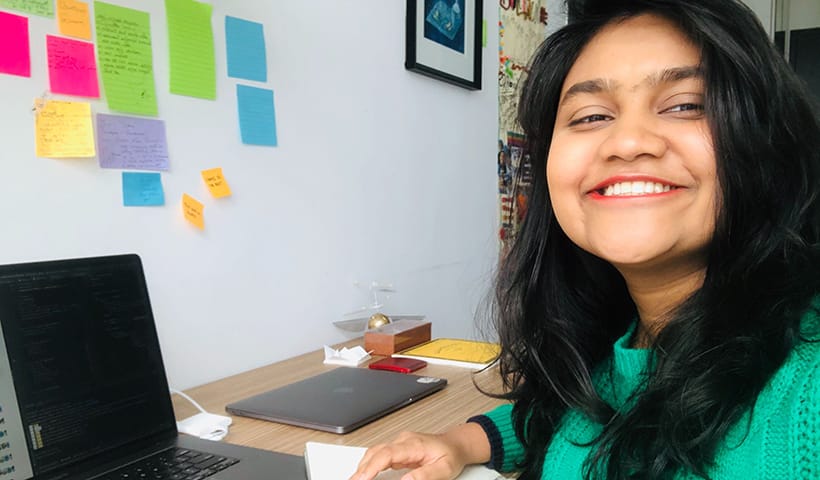Before the pandemic, I don’t think I’d ever fallen asleep by 10.00 pm. Somehow, that’s a daily occurrence now. I wake up between 6.30 am - 7.00 am, meditate, get my endorphins pumping with some boxing, make a smoothie, perform the usual morning stuff, then I’m at my desk by 8.30 am.
Each working day is filled with various meetings, working on code, battling with bugs in said code, and of course, calling my teammates about said bugs in said code. I wrap up by 5.30 pm, then comes self-care and “social” time: reading, calligraphy, video-calling friends, and family. Then, like clockwork, head to pillow by 10.00 pm; for the first time in my life!
When I started as an RMIT intern at PaperCut I never would have guessed my tiny studio apartment would also be my workplace. But in late March, after just two weeks into my new job here, remote working was the reality all PaperCutters faced. Those of us in the Melbourne office have been enduring lockdown now for 203 days and counting (at the time of writing).
I live by myself, so I am obviously super keen for this lockdown to come to an end. But you know what? After years of uncertainty studying and job-seeking as an international student, it’s actually provided me with an opportunity; I’ve finally settled on a routine.
The international student struggles of job seeking
Don’t get me wrong, working in a pandemic is definitely not what I had in mind when I first started my career in software engineering. But, to be honest, for a long time just finding an internship as an international student was a fulltime job in itself.
Summer of last year I was applying for 10 jobs per day! I was under a lot of pressure to find a job because it was a requirement for my engineering degree at RMIT.
The main obstacle? It’s really hard to find an internship as an international student; especially when you have one year left at university. Throughout my degree I attended every Melbourne job fair and expo, there seemed to always be a blanket “no international student” policy.
Just to get a foot in the door
I volunteered everywhere: at RMIT, student councils, computer science societies. I attended a lot of meetups to develop my network. I worked really, really hard to get ridiculously good grades.
That actually led to me becoming a tutor in my second year (usually reserved for post-grad students) where I taught discrete structures in computing and user-centered design. I had to do all that, just to get a foot in the door.
On top of being an international student, there was also the reality of being a female in the tech industry. I was one of a few girls in my entire degree. It was really hard to just give your opinion during projects.
There were a lot of obstacles that I had to go through. But in a way, I guess it was university just preparing me for the “real-world experience” of entering the workforce.
One thing university didn’t prepare me for was working during a pandemic
I started with PaperCut in March. I’d come across the post for a mid-level engineer role in Glassdoor while applying for dozens and dozens of jobs. I applied and the People Experience team reached out to let me know about PaperCut’s intern program… and that’s how I became the first intern from RMIT! Woo!
During my short amount of time at our Camberwell office, all my expectations as an associate product engineer were met! I love front-end engineering and my team provided lots of opportunities for me to build my soft and tech skills. I was finally working in the industry. It was like a dream. I’d made it…
Then, BAM! Lockdown life!
I’m very fortunate that I’m able to work from home, but, to be honest, I was really disappointed when we had to switch to our remote working model. This is my first real job! I was really looking forward to getting hands-on experience, going to meetings, talking to people in real-time.
The biggest difference between office and remote working is, obviously, the people. In my first two weeks, I was getting familiar with the PaperCut culture, getting to know my new colleagues. With remote working that declined, virtual interaction became the standard.
When I was starting out I didn’t know many of the technologies we were using here at PaperCut. Golang was a whole new world for me, I was really struggling to get the grips of it enough to be a productive member of my team. I felt a little guilty asking too many questions, like I was interrupting. If we were in the office I wouldn’t feel like I was imposing so much.
There was a bit of imposter syndrome on top of that. But my teammates were always there for me. The support hasn’t changed from office to remote working.
This is my normal
I was only at the office for two weeks so this is my normal. It’s allowed me to learn and regularly practice self-sufficiency and discipline. The transition and learning curve was easy thanks to my initiative team, they’ve supported me immensely.
Still, keeping myself motivated is hard. Especially when there’s a lot of bugs in my code so the tests are failing. But I just need to keep telling myself, “It’s okay, I CAN DO THIS,” and build my resilience. On top of that self-affirmation and perspective, I reach out for assistance from my team when I need it. And, you know, Google helps!
What’s life like for an intern during a pandemic?
Despite this difficult period, I’m actually learning more than what I expected when coming to PaperCut. The fact that I, an intern, could drive company-wide demos, from my desk at home, was a massive deal for me! I’m really grateful for that opportunity.
Beyond that, PaperCut has helped me build my tech skills and mostly my soft skills. I’ve learned so much by observing our leaders at PaperCut: how our CEO Chris Dance handles everything; how genuine everyone is. I’m gonna carry that culture with me for the rest of my career. The transition, the learning curve was easy, thanks to my team.
My advice for interns?
No matter how hard everything gets and how many times people say, “Nah, you can’t do it” - just be resilient and proactive. Immerse yourself in what you want to do, what you’re passionate about. You’ll see great results when you do that.
Oh, and seriously, Google that weird bug in your code first!


